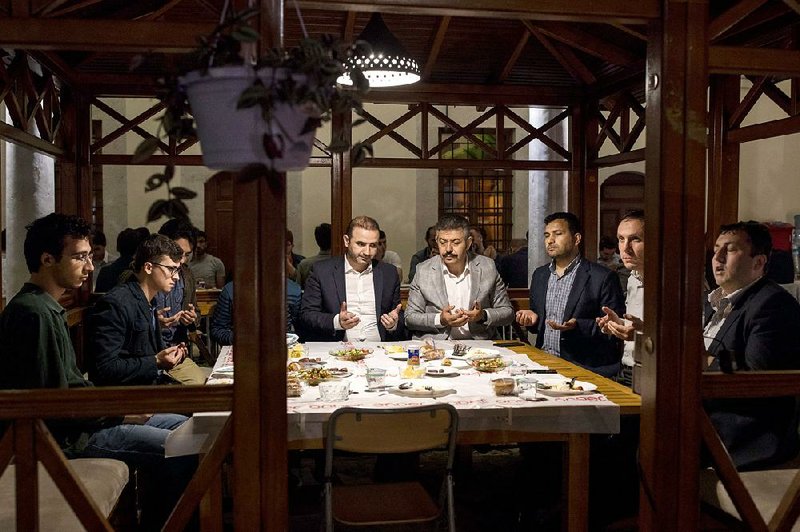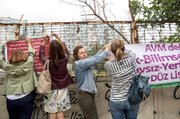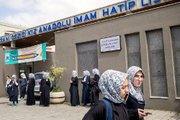ISTANBUL — Public schools are closing, on little or no notice, and being replaced by religious schools. Tens of thousands of public teachers have been fired. Outside religious groups are teaching in schools without parental consent.
The debate over how to shape Turkey’s next generation is ongoing as President Recep Tayyip Erdogan seeks re-election Sunday, and education has become a central issue as parents around the country are scrambling to find schools of their choice
The country is still in a state of emergency after a failed coup in 2016, and Erdogan has dismissed from the courts and civil service any suspected opponents.
Erdogan has also been pushing as president to expand religious education — a decision that has drawn mixed reactions.
While prime minister, six years ago, Erdogan declared his desire to “raise a pious generation.”
“Do you expect that a party with a conservative, democratic identity would raise an atheist youth?” he said, challenging his opponents about the aims of his Justice and Development Party. “You may have such an aim, but we don’t.”
The words revealed a cause close to Erdogan’s heart and those of his supporters in his conservative, rural and religious base.
For them, the drive for religious schools represents a democratization of education and the reversal of the discrimination under the secular republic.
Turkey’s religious roots run deep, even if the separation of religion and state is well established. Erdogan’s main presidential challenger, Muharrem Ince, has not opposed the drive for religious schools, but rather sought to seize the issue from him.
A former physics teacher, Ince speaks proudly of his early career teaching in a religious school. He has attacked Erdogan for using the religious schools to win votes, not the schools themselves.
But he promises religious schools and courses will be optional, and vows to raise a generation of scientists and space engineers for the digital age.
The stance is clearly intended to unite an electorate that has been divided by Erdogan’s program, which has replaced many secular public schools with religious ones, known as Imam Hatip schools. (The name means Cleric Preacher.)
The Imam Hatip schools teach the national curriculum, but roughly half their courses are religious and their core classes — those which a student has to pass to matriculate — are the Koran and Arabic.
Erdogan has vastly expanded the schools, from just 450 schools to 4,500 nationwide over the past 15 years. His government increased the budget for religious education this year by 68 percent, to $1.5 billion.
As the elected head of the government, Erdogan has every right to make the changes he wants, said Batuhan Aydagul of the Education Reform Initiative, a nongovernmental organization that seeks to improve critical thinking in the education.
Eighty-seven percent of the school population is still in nonreligious schools, he noted.
But especially among the aspiring middle class of Istanbul and other cities, parents have complained that Erdogan has pushed religious instruction in ways that have been divisive, deceptive and damaging to educational standards.
Some parents are pulling their children from the religious schools and sending them to private ones, or settling unhappily for technical and vocational schools.
The Education Ministry has acknowledged that 69 percent of places in Imam Hatip schools remained unfilled as late as 2016. But the schools keep sprouting up.
In Besiktas, a district on the European side of Istanbul, parents have been fighting a losing, two-year battle to prevent their neighborhood school from being turned into an Imam Hatip school.
“We started with a slogan ‘Don’t Touch my School,’” said Gunay Imir, a retired factory worker and trade unionist whose youngest son is still at the school. “Then we saw the problem was much more widespread and now we have the Movement for Secular, Scientific Education.”
The movement coordinates activists from 20 cities around the country, she said.
Still, the school has been partially converted into an Imam Hatip school, and religious instruction has increased.
Last year, a class of 12-year-olds was shown a film about demons that was so violent and scary that several had nightmares, parents said.
“The film teaches if you renounce your faith you will have this horror,” said one parent, Erdogan Delioglu. Despite parents’ complaints, the same film was shown to another class last month.
“They are stealing the children’s future,” Delioglu said.
For Erdogan, the drive for religious education is deeply personal. He was educated at an Imam Hatip in the district of Fatih, in Istanbul, and oversaw its $12 million renovation. He sent his daughter to the one in Acibadem.
“To some extent his being a graduate of an Imam Hatip may affect him emotionally,” said Halit Bekiroglu, a spokesman for the Imam Hatip Graduates’ Association, who said he knows the president personally.
In 2017, at the reopening of his old school, Erdogan reminisced about his time there, but also spoke with bitterness about the ignorance and discrimination he faced.
“When I was a student here, there was no other Imam Hatip in Istanbul,” Erdogan said, in comments reported by the newspaper Haberturk. “Some of our teachers would say to us, ‘Why did you come here? Are you going to be a washer of dead bodies?’”
As a budding politician, Erdogan witnessed a military coup against the Islamist government of Necmettin Erbakan in 1997 — he was a member of his party.
The generals forced the closing of all religious middle schools and barred the majority of graduates from Imam Hatip schools from entering university.
Still, supporters say they want to see Erdogan’s push for religious education expanded to meet demand.
“On a social level, we think it is appropriate and we even consider it not enough,” said Bekiroglu of the graduates association.
Fourteen percent of pupils — roughly 1.4 million — were studying in religious schools by 2017, he said. He would like to see the number rise to 20 percent in high schools and 30 percent in middle schools.
When asked about their schooling, graduates of Imam Hatip schools, who had gathered to break the Ramadan fast together in a 16th century madrasa, spoke enthusiastically of the quality and camaraderie.
“Very beautiful,” said Hilal Misirli, 21, “because you study subjects others take, but also what you believe.”
But many link Turkey’s recent fall in international rankings — it dropped in the PISA index, which evaluates critical thinking, from 44th to 49th out of 72 countries — to constant disruptions and the focus on religion.
“When I started 18 years ago the quality was high,” said Aysel Kocak, a district leader of the Union for Laborers of Education and Science, who teaches math at a technical school in Istanbul’s third district. “Now I cannot teach them as intensively as I would wish.”
She pointed to a working-class district of Istanbul, in Kagithane, that has two public high schools, but seven Imam Hatip schools — five for girls — and eight technical schools.
“This illustrates what this government proposes for low-income people,” she said, “that your son will end up as cheap labor and your daughter in an Imam Hatip.”


